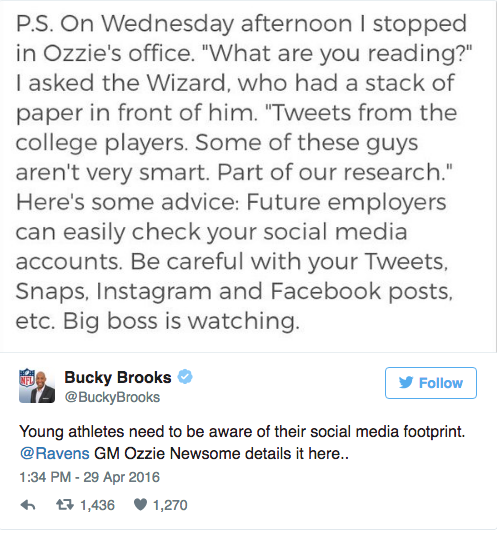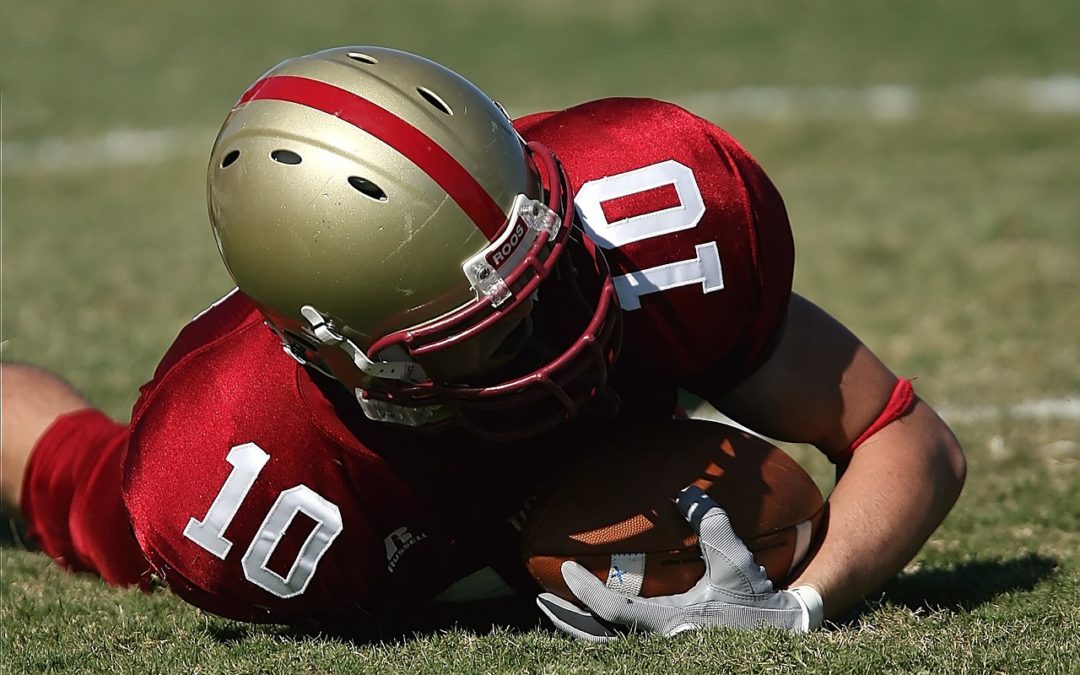The NFL Draft makes it clear that an ill-advised online post can put anybody’s career at risk, and I think the NCAA is as much at fault as the athletes.
*This article was originally published on the HuffingtonPost
Did you ever tweet something personal, or post an angry Facebook rant on a whim that you later realized was a mistake? If you haven’t, you’re likely to at least have witnessed it: in today’s day and age, online sharing is a ubiquitous form of personal expression. Unfortunately, it’s also permanent, meaning a single ill-advised update can haunt you much later.
At BrandYourself, we constantly deal with people who’ve damaged their career prospects over something they’ve posted online. It’s something that can happen to anyone from a naive high school student who loses their scholarship to a seasoned executive who loses their job with a single tweet.
We now live our entire lives online, and when we make mistakes, it can have effects on our careers that we never thought possible.
This is a growing problem for all professionals. When anyone can say anything about anyone and our online actions are cached forever, the result is a recipe for embarrassment at best and career ruin at worst.
The NFL draft was dominated by online mishaps from student athletes
The NFL draft makes it clear that a bad online post can put anybody’s career at risk — even and perhaps especially rising athletes. This year, virtually all of the Google results for top draft picks were dominated by personal results, often to the detriment of the athletes’ prospects and putting the organization in a difficult situation. Look at some of the most salient examples:
- Laremy Tunsil might have lost $10M over a tweet. The Miami Dolphins rookie was projected to be a top-five pick for the NFL draft, but just 15 minutes before the draft began, a video appeared on his Twitter feed of him smoking a substance with a bong and gas mask. As a result, Tunsil fell from 3rd pick to 13th, a slide which allegedly cost him as much as $10 million in signing bonuses. Tunsil himself denies posting; it’s likely that someone, perhaps his former business manager, accessed his account. This just goes to show that just as easily as you can undo yourself with an irresponsible post, someone else can — whether from your account or theirs.
- Wendell Smallwood put himself in a difficult position with his new team. Though he was drafted by the Philadelphia Eagles, his position was jeopardized shortly after when old tweets surfaced allegedly containing homophobic and anti-Philly remarks. Smallwood recently apologized for his youthful transgressions, stating that the tweets “didn’t represent who I am and what I stand for….I definitely think that was a real mistake, so I’m real embarrassed anyone had to read that.” Like many young kids, he tweeted things without understanding or considering the long-term consequences.
Even outside of scandals, organizations go out of their way to vet athletes on social media
It’s no surprise that organizations like the NFL and its teams are trying to distance themselves from players with unsavory online footprints.
- Press Liability: It’s a new press liability to employ such individuals, regardless of their athletic ability, so organizations use Google search and social media to screen prospects and avoid public controversy. In other words, they want to avoid a Johnny Manziel nightmare. In an old world, a coach might have been able to privately work on a player’s maturity before parting ways, but in today’s world he’s forced to face it, despite the athletic ability of the player.

- It helps them vet people who could be a disaster later: Looking into social media as draft research gives insight into who could potentially cause issues later, surfacing any red flags that might make the player a bad investment. It also helps them avoid drafting players who may not be a culture fit. An extreme example is Ray Rice. When Ray Rice was filmed knocking out his fiancee in an elevator, it earned him a suspension, an investigation, and lots of bad press. Perhaps if the Baltimore Ravens had taken it upon themselves to investigate beyond his athletic ability, they would have found indicative behavior and avoided recruiting him.
The point is, athletes need to be aware: The Baltimore Ravens’ general manager Ozzie Newsome now personally reads through college players’ tweets as part of his drafting research. It’s become more and more common for teams like the Ravens to monitor social media alongside other recruiting information like game films, interviews, and medical reports.
Colleges and the NCAA owe it to their athletes to prepare them
It goes without saying, the athletes embroiled in these controversies and embarrassments are responsible and should be held accountable for their behavior — whether it be criminal or simply immature. But they are not the only ones at fault. I think that the NCAA in particular owes it to student athletes to teach discretion and responsibility online.
- Most young students/people have said something regrettable, but they aren’t about to be on the national stage like a student athlete. Almost all of us at some point share words, photographs, or videos that we may regret or be embarrassed by. But athletes in particular are under a microscope and don’t necessarily get more training on the ramifications than anyone else. Add a national stage to a student’s personal network, and ugliness and judgment are bound to ensue.
- The NCAA and College make a lot of money off all of their athletes, and should be providing them more guidance. The organization has a long history of profiting off of students, who do not get paid, even when a majority of them won’t make it to the NFL. The NCAA arguably jeopardizes students’ safety, exploits their talent, and on top of it fails to prepare them for what’s to come — whether by eschewing their academic responsibility or allowing them to flounder over online mishaps.
The NCAA should educate students about online reputation
What is the solution? For starters, the NCAA should educate student athletes about online reputation and equip athletic organizations and schools with the tools to control them. That’s why BrandYourself exists — to help everyone, from students to executives, gain control of their digital presence for personal and professional benefit.
- A good start is teaching them the basics of online reputation management. At BrandYourself we provide a free guide that teaches users of all skill sets to diagnose their Google results, learn the basics of personal Search Engine Optimization, and execute tactics to ultimately improve results.
- A second would be to invest in tools that help them as an extra defense. BrandYourself and similar companies are constantly developing new tools that evaluate search results and recommend action for improvement. Our newest tool will be a social scrubber to identify tweets and posts that could cause potential trouble down the line — something that will be especially useful for student athletes preparing for mass publicity.
Let’s recap:
The NFL draft is a perfect example of how a single bad online posting can put anyone’s career at risk:
- This year’s draft had some very damaging examples where ill-advised posts deeply affected students’ career prospects. This illustrates the larger issue people of all professions face due to bad posting habits, or even one single slip-up.
- With organizations increasingly using social media to vet candidates outside of their athletic ability, it’s now common practice for teams (and really, any potential employer) to monitor online activity to avoid press liabilities and future disasters.
- The NCAA and universities owe it to their athletes to prepare them — because they are more at risk than the average student, but also because they profit off of students while failing to prepare them for long-term success.
- Schools and organizations can do better by educating student athletes on how to manage their online reputations. They can also invest in tools that help ensure they aren’t compromised by mistakes of the past.
At the end of the day, sticks and stones may break your bones and a tackle can give you a concussion, but a mere 140 character tweet can ruin your career. With the right tools and careful practice, athletes can let their online reputations soar past the end zone, instead of ending it all in a fumble.


